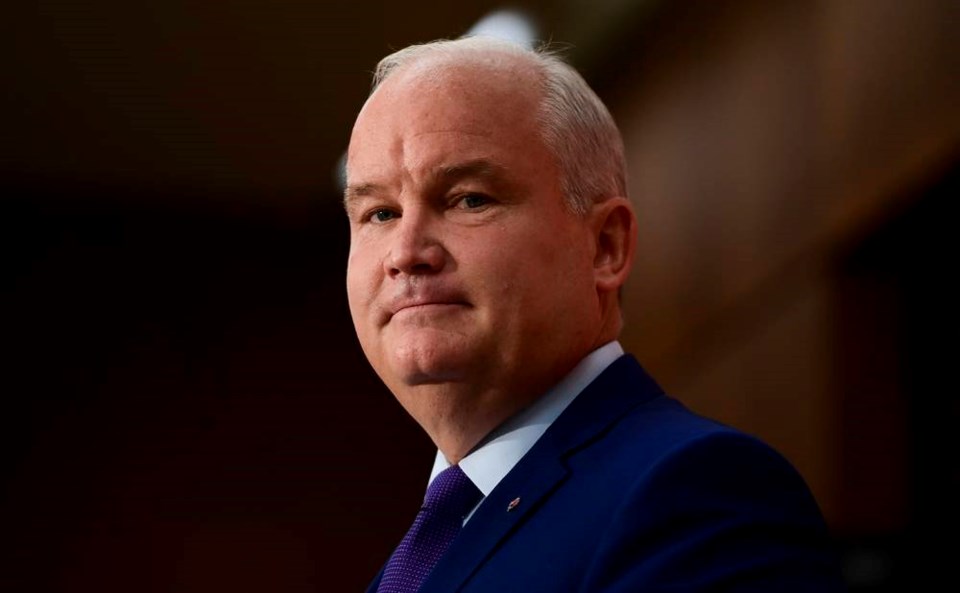So the federal Tories finally have a new leader, Ontario’s Erin O’Toole. “Finally,” because it’s fully eight months since the incumbent, Andrew Scheer, announced he was resigning.
Yes, the COVID outbreak caused a brief lull in hostilities. But allegations of hacking, disputes about which candidates had qualified and confusion over deadlines dragged the process out interminably.
Meanwhile, during those long eight months, Prime Minister Justin Trudeau staggered from one self-inflicted crisis to another without effective opposition. Here, if ever, was an opening the Tories should have seized
Some of that is down to Scheer. How this amiable but invisible nonentity ever got the job is one of nature’s mysteries. It was clear from the start that he could never lead a demoralized party back to power.
And now we have Erin O’Toole, a man two-thirds of Canadians have pretty much never heard of, along with a significant chunk of Conservatives.
Nova Scotia’s Peter MacKay, who came second after appearing a shoo-in, at least had name recognition. O’Toole is starting from scratch. For the Tories, and arguably the country, that’s a problem.
Two weeks ago, the finance minster, Bill Morneau, suddenly resigned. This came after allegations he had failed to disclose ownership of a private company, contrary to conflict-of-interest regulations.
But it also followed hints from party insiders that Morneau was viewed as too right-wing. The suggestion appears to have been that left to himself, Morneau would never have approved the massive $343-billion deficit favoured by the prime minister.
That suspicion gained strength when Trudeau immediately replaced Morneau with his deputy prime minister, Chrystia Freeland.
The contrast could hardly be more pronounced. Morneau earned degrees in business administration and economics.
Freeland, a Rhodes Scholar, studied history and literature. Her book Plutocrats: The Rise of the New Global Super-Rich and the Fall of Everyone Else suggests her likely approach: Tax the super-rich and spend the takings.
To give Freeland time to build her strategy, Trudeau prorogued parliament for six weeks. Not by accident, he thereby bought himself some breathing space as well.
Several parliamentary committees were due to report on the prime minister’s various ethical adventures. Those committees are now in limbo.
With parliament sent packing, Trudeau then announced $37 billion in additional spending, oversight be damned. L’état, c’est moi.
When opposition leaders denounced this end-around, the prime minister gamely asked if they would have preferred he postpone the new spending. The obvious answer was no, they would have preferred he postpone the prorogation.
We might then ask why any of this was allowed to happen. Certainly the prime minister is entitled, if he wishes, to ask the Governor General to prorogue parliament.
But Trudeau heads a minority government. It was within the power of the opposition parties to inform him that if he proceeded, he would face a non-confidence vote when parliament resumed.
So why didn’t they? The answer is bound up in the most immediate question facing O’Toole.
If the opportunity arose, would you force an election this fall? During a COVID pandemic? Preferably not. Voters might resent it.
On the other hand, Trudeau says he intends a major overhaul of the country’s social-welfare services when parliament returns. That almost certainly will involve still more spending. Is the country ready for this?
Of course, the decision to force an election is not up to the Tories alone. They would need support from a majority of NDP and Bloc Québécois members.
The latter might go along — anything to make mischief. The former almost certainly wouldn’t — they have little to gain from opposing social-welfare reforms.
Which brings us back to O’Toole. If he cannot outright force an election, can he muster the resolve to skewer an incumbent administration grown visibly complacent?
He has this much going for him. Even some of the prime minister’s own colleagues are said to be nervous about his profligate spending, while his disdain for moral probity is a growing liability.
When the House resumes this fall, a critical moment will arrive.



